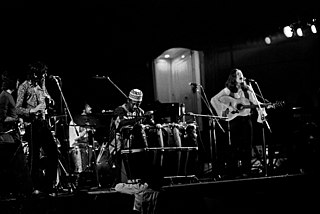
Traffic were an English rock band formed in Birmingham in April 1967 by Steve Winwood,Jim Capaldi,Chris Wood and Dave Mason. They began as a psychedelic rock group and diversified their sound through the use of instruments such as keyboards,sitar,and various reed instruments,and by incorporating jazz and improvisational techniques in their music.

Stephen Lawrence Winwood is an English musician and songwriter whose genres include blue-eyed soul,rhythm and blues,blues rock,and pop rock. Though primarily a guitarist,keyboard player,and vocalist prominent for his distinctive,soulful high tenor voice,Winwood plays other instruments proficiently,including drums,mandolin,bass,and saxophone.

Nicola James Capaldi was an English singer-songwriter and drummer. His musical career spanned more than four decades. He co-founded the progressive rock band Traffic in 1967 with Steve Winwood with whom he co-wrote the majority of the band's material. He was inducted into the Rock and Roll Hall of Fame as a part of Traffic's original lineup.

David Thomas Mason is an English singer-songwriter and guitarist from Worcester,who first found fame with the rock band Traffic. Over the course of his career,Mason has played and recorded with many notable pop and rock musicians,including Paul McCartney,George Harrison,the Rolling Stones,Jimi Hendrix,Eric Clapton,Michael Jackson,David Crosby,Graham Nash,Steve Winwood,Fleetwood Mac,Delaney &Bonnie,Leon Russell,and Cass Elliot. One of Mason's best known songs is "Feelin' Alright",recorded by Traffic in 1968 and later by many other performers,including Joe Cocker,whose version of the song was a hit in 1969. For Traffic,he also wrote "Hole in My Shoe",a psychedelic pop song that became a hit in its own right. "We Just Disagree",Mason's 1977 solo U.S. hit,written by Jim Krueger,has become a staple of U.S. classic hits and adult contemporary radio playlists.

Beautiful Loser is the eighth studio album by American rock artist Bob Seger,released in 1975. This album marked Seger's return to Capitol Records after a four-year split. His previous record with Capitol was Brand New Morning in 1971.
"The Low Spark of High Heeled Boys" is the title track from the 1971 album by British rock band Traffic,written by Jim Capaldi and Steve Winwood. Despite never being released as a single due to its long duration,it became a staple of North American AOR-format FM radio stations in the 1970s and still receives airplay on classic rock radio today.

John Barleycorn Must Die is the fourth studio album by English rock band Traffic,released in 1970 as Island ILPS 9116 in the United Kingdom,United Artists UAS 5504 in the United States,and as Polydor 2334 013 in Canada. It marked the band's comeback after a brief disbandment,and peaked at number 5 on the Billboard Top LPs chart,making it their highest-charting album in the US,and has been certified a gold record by the RIAA. In addition,the single "Empty Pages" spent eight weeks on the Billboard Hot 100,peaking at number 74. The album was marginally less successful in the UK,reaching number 11 on the UK Albums Chart.
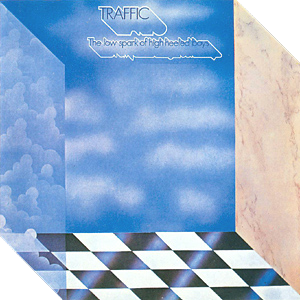
The Low Spark of High Heeled Boys is the fifth studio album by English rock band Traffic,released in 1971. The album was Traffic's most successful in the United States,reaching number 7 on the Billboard Top LPs chart and becoming their only platinum-certified album there,indicating sales in excess of one million. However,it failed to chart in the United Kingdom. The album features the minor hit "Rock &Roll Stew" and the title track,which received heavy FM airplay.

Mr. Fantasy is the debut album by English rock band Traffic,released in December 1967. The recording included group members Jim Capaldi,Steve Winwood,Chris Wood,and Dave Mason;Mason temporarily left the band shortly after the album was released. The album reached the number 16 position in the UK Albums Chart,and number 88 on the Billboard Top LPs chart in the United States.

Shoot Out at the Fantasy Factory is the sixth studio album by English rock band Traffic released in 1973. It followed their 1971 album The Low Spark of High Heeled Boys and contained five songs. Shoot Out,while achieving poorer reviews than its predecessor,did reach number six on the Billboard Pop Albums chart,one space higher than Low Spark had peaked in 1972. Like its predecessor,the original jacket for the Shoot Out LP had its top right and bottom left corners clipped. The album was remastered for CD in 2003.

When the Eagle Flies is the seventh studio album released by English rock band Traffic,in 1974. The album featured Jim Capaldi,Steve Winwood and Chris Wood,with Rosko Gee on bass guitar. Percussionist Rebop Kwaku Baah was fired prior to the album's completion,but two tracks feature his playing. Winwood plays a broader variety of keyboard instruments than most previous Traffic albums,adding Moog to their repertoire. This was the last Traffic album for 20 years,when Winwood and Capaldi reunited for Far from Home in 1994.

Welcome to the Canteen is the first live album by English rock band Traffic. It was recorded live at Fairfield Halls,Croydon and the Oz Benefit Concert in the canteen of the Polytechnic of Central London London,on 3 July 1971 and released in September of that year. It was recorded during Dave Mason's third stint with the band,which lasted only six performances.

On The Road is the second live album by English rock band Traffic,released in 1973. Recorded live in Germany,it features the Shoot Out at the Fantasy Factory band,with the Muscle Shoals Rhythm Section of keyboardist Barry Beckett,bassist David Hood,and drummer Roger Hawkins.

Junction Seven is the seventh solo studio album by English musician and songwriter Steve Winwood,released in June 1997. The album broke the Top 40 in the UK but did not sell well in the US,and Winwood took a six-year break from making solo albums. This album was co-produced with Narada Michael Walden,while Winwood's wife Eugenia co-wrote several songs. Des'ree provided vocals on 'Plenty Lovin'.

Steve Winwood is the debut solo studio album by blue-eyed soulster Steve Winwood. It was released in 1977,three years after the break-up of his former band,Traffic. Though the album sold moderately well in the US,it was a commercial disappointment compared to Traffic's recent albums,peaking at number 22 on the Billboard 200 album chart. In the UK,however,while Traffic's recent albums had only been moderately successful,Steve Winwood reached number 12 on The Official Charts. Island Records launched two singles from the album,"Hold On" and "Time Is Running Out",both of which failed to make the charts.
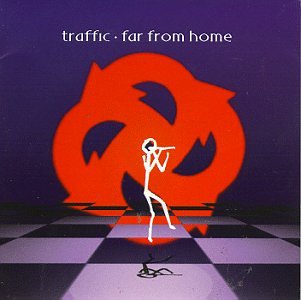
Far from Home is the eighth and final studio album by the rock band Traffic. It was recorded at a large house called Woodstock,outside Kilcoole to the south of Dublin,and mixed at the Chateau Miraval in Correns,southern France. The project began as a revival of the writing collaboration between Steve Winwood and Jim Capaldi,but soon blossomed into the first Traffic project since 1974.
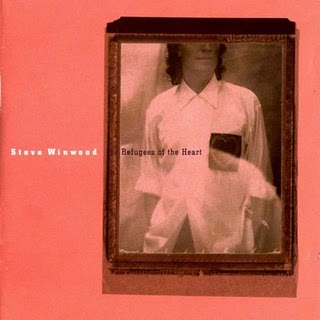
Refugees of the Heart is the sixth solo studio album by Steve Winwood,released in 1990. The album contained the hit single,"One and Only Man",which topped the Mainstream Rock Tracks chart,was #18 at Billboard's Hot 100 and saw the return of former Traffic bandmate Jim Capaldi to Winwood's songwriting team. A Traffic reunion followed in 1994,and because of that collaboration,Winwood would not record another solo album until late 1997. "I Will Be Here" and "Another Deal Goes Down" were also released as singles.

Whale Meat Again is the second studio album by the British musician Jim Capaldi,released by Island Records in 1974. Like his first solo album,it failed commercially in his native United Kingdom but did better in the United States. With help from the opening track,"It's All Right",which spent seven weeks in the Billboard Hot 100 and peaked at number 55,the album reached number 191 in the Billboard 200.
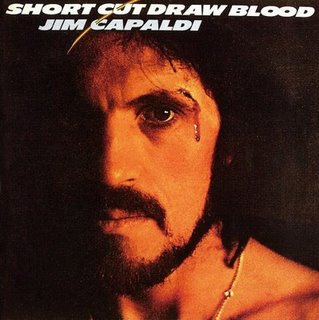
Short Cut Draw Blood is the third studio album by the British musician Jim Capaldi,released by Island Records in 1975. It marked a major turning point in Capaldi's career:it was his first album recorded after the breakup of Traffic,and more importantly it was his commercial breakthrough. While Capaldi's first two solo albums had been moderately successful in the United States,Short Cut Draw Blood entered the charts in several other countries for the first time. This was particularly evident in his native United Kingdom;the single "It's All Up to You" at number 27,released a year before the album,became his first top 40 hit there,only to be overshadowed the following year by his cover of "Love Hurts",which went all the way to number 4.

Fierce Heart is the eighth solo album by British musician Jim Capaldi. The album has a far more synth-heavy approach than any of his previous albums,though the songs are mostly in the same aggressive rock/pop vein that Capaldi had long been associated with. This synth-heavy pop sound was exactly what 1980s audiences were looking for,and the songs "That's Love" which broke the top 40 in the US at number 28,and "Living on the Edge" at number 75,became hit singles. The album itself reached number 91 on the Billboard 200.



















